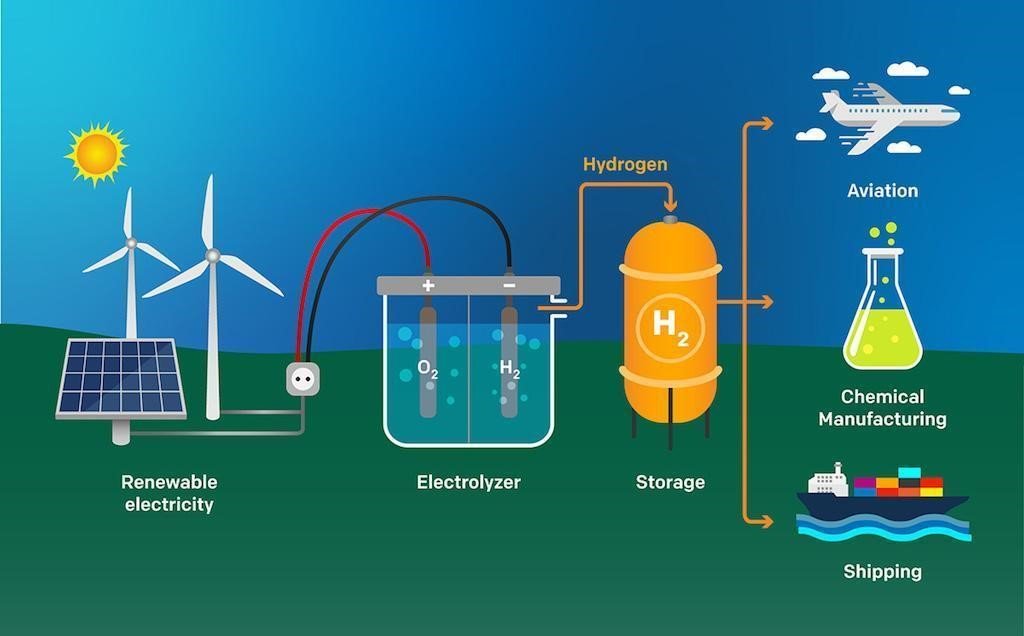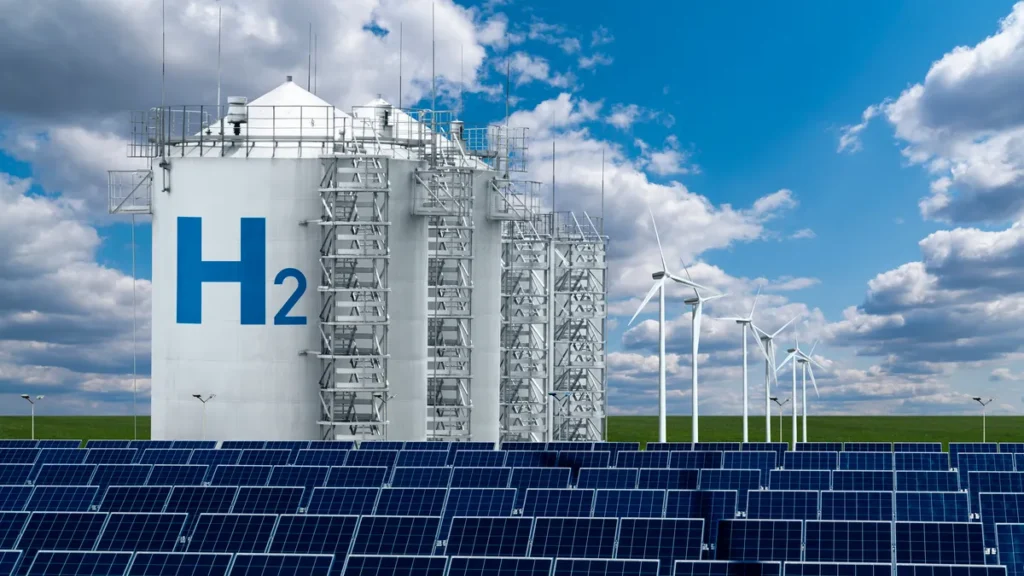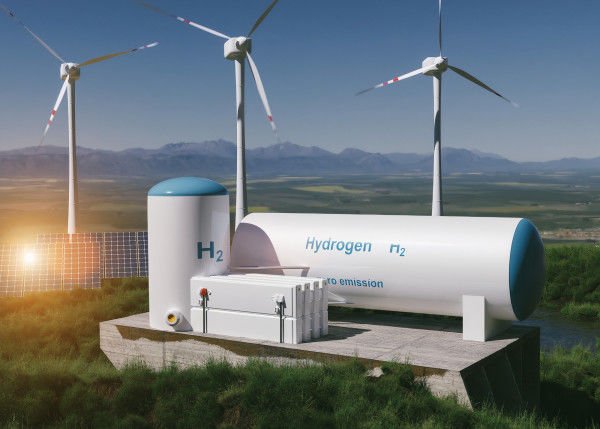The conversation about a cleaner energy future is no longer theoretical — it is happening now. Across Abuja and in private boardrooms, policymakers and investors are talking about Green hydrogen as a serious export commodity for Nigeria. The idea is straightforward: use renewable power to split water into oxygen and hydrogen, then sell that hydrogen (or convert it to ammonia) to customers in Europe and Asia who need low-carbon fuels. Nigeria has the coastline, sunlight and existing energy-industrial skills to compete — but only if policy, finance and local jobs are prioritised from day one.
Table of Contents

Turning oil-era infrastructure into a clean-export platform
The Niger Delta has long housed pipelines, terminals and skilled workforces built for oil and gas. Those assets are not worthless in the green transition — they can be repurposed. International partners and Nigeria’s own policy teams are already discussing a National Hydrogen Policy to coordinate renewables, electrolysis plants and export logistics. That active policy work was the subject of a national hydrogen working group supported by the German–Nigerian Hydrogen Office earlier this year, showing that the idea has moved from concept to planning.
At the same time, national studies and sector analyses point to realistic hurdles: electrolyser costs, stable renewable power, water availability for electrolysis and port upgrades for export. The GIZ sector analysis on green hydrogen in Nigeria makes this point clearly — the technical and regulatory groundwork must be done before large-scale exports are viable. That’s why Nigeria’s pathway must blend short-term demonstration projects with a long-term investment plan.
Jobs, local content and community benefits — the non-negotiables
If green energy projects in the Niger Delta repeat past mistakes, the result will be foreign profits without local prosperity. Nigeria’s local content agencies and industry voices have already stressed the need for job localisation in new energy projects. The Nigerian Content Development and Monitoring Board (NCDMB) — whose past public statements and programmes promote local participation and skills development — is a natural ally in ensuring that hydrogen contracts include binding local-employment and training obligations. Recent NCDMB coverage highlights the board’s focus on translating energy projects into domestic industrial capacity and jobs.
Practical steps that would keep jobs for Delta communities include: mandatory local-hire percentages during construction and operations, apprenticeship schemes tied to export plants, and on-site training centres run in partnership with local polytechnics and universities. These measures are not hypothetical: Nigeria’s experience raising local content in oil and gas offers models that can be adapted for hydrogen — provided regulators write those rules into project approvals and monitor compliance.

How Nigeria can act now — finance, policy clarity and honest partnerships
There is a narrow strategic window for Nigeria. Global buyers are signing bilateral agreements and looking for reliable suppliers of low-carbon hydrogen and ammonia. The Guardian’s recent reporting on Nigeria’s ambitions — including targets for large export volumes and export revenue — shows external demand is real. But to convert interest into contracts, Nigeria must offer investment certainty: predictable taxes, transparent tender processes, and credible guarantees on land, security and community engagement.
Finance remains the largest practical barrier. Electrolysers, transmission upgrades and export terminals require billions of dollars of capital. Multilateral agencies, green climate funds and development finance institutions are potential partners, but they will insist on strong governance, measurable local benefits and environmental safeguards. That is why the government’s hydrogen policy must include clear local-content rules, environmental baseline studies for host communities, and a timeline that aligns renewable power build-out with electrolyser commissioning. The Germany–Nigeria hydrogen dialogue underlines this coordinated approach.
Why truthful, verifiable engagement matters
Two practical points show how to make this transition honest and durable. First, partners and investors must deal with communities as equal stakeholders, not as afterthoughts. The Delta’s past grievances — oil spills, flares, and jobs that never materialised — are still raw. Any hydrogen project that promises jobs must publish the job guarantees, the contracting rules and the training plans publicly. Second, Nigeria must insist on measurable, independent audits of local employment and environmental performance. The NCDMB’s track record in pushing local content provides a governance starting point, but hydrogen will need sector-specific rules and enforcement.
Across Africa, commentators and researchers have cautioned that a rapid “green hydrogen rush” could leave host countries with little value if policy and business models aren’t designed to capture local benefits. That is the lesson Nigeria must absorb: ambition alone will not generate long-term prosperity. What will matter is the contract detail — the clauses that bind investors to local hiring, supply-chain development and pollution control. Academic analyses of hydrogen in Africa reiterate this tension between opportunity and capture, and urge policy-first approaches.

Conclusion: the Niger Delta’s chance to lead — if Nigeria chooses justice over haste
There is no reason the Niger Delta cannot be central to Nigeria’s hydrogen export story. The region has skilled people, an industrial tradition and proximity to export routes. But the central test is straightforward: will Green hydrogen projects function as engines of local development, or will they simply be another export line that bypasses communities?
If Abuja, state governments and regulators get the policy architecture right — combining transparent procurement, enforceable local-content rules and credible environmental safeguards — Green hydrogen can deliver export earnings and jobs. Conversely, if contracts arrive without community guarantees, Nigeria risks repeating the old pattern of resource wealth without local benefit.
The international interest is real — partners from Europe and beyond want supply chains that meet strict environmental standards. Nigeria can meet that demand and turn Green hydrogen into a vehicle for economic repair in the Niger Delta, but only if the promise of jobs and clean air is written into every agreement and independently verified. That is not rhetorical: it is the only path to credible, sustainable exports that actually help the people who live where the projects are built.
Sources:
- German–Nigerian Hydrogen Office: report on Nigeria’s national hydrogen policy working group. h2diplo.de
- GIZ — Sector analysis and Nigeria energy transition materials (green hydrogen technical and policy challenges). Gizmodo
- Nigeria4H2 project findings and national readiness discussions (coverage in The Guardian on Nigeria’s green hydrogen target). The Guardian Nigeria
- Nigerian Content Development & Monitoring Board (NCDMB) reporting and local-content materials.
- Academic and policy analyses of green hydrogen in Africa (context on risks and the need for policy-first approaches).
Join Our Social Media Channels:
WhatsApp: NaijaEyes
Facebook: NaijaEyes
Twitter: NaijaEyes
Instagram: NaijaEyes
TikTok: NaijaEyes




